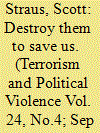|
|
|
Sort Order |
|
|
|
Items / Page
|
|
|
|
|
|
|
| Srl | Item |
| 1 |
ID:
114672


|
|
|
|
|
| Publication |
2012.
|
| Summary/Abstract |
Based on an analytic review of recent scholarly advances in genocide studies, this article investigates the causes, concept, and logic of genocide while suggesting a set of theoretical propositions and avenues for future research. Two emerging theoretical streams of literature on causes-strategic and ideological-highlight different dimensions of genocide and should be thought of as compatible. The study of genocide should be embedded in a broader study of political violence; the two literatures have been strangely cloistered from each other. To that end, genocide should be conceptualized as group-selective, large-scale violence whose purpose is group destruction. This stands in contrast to violence that is individually selective or indiscriminate; small-scale and not sustained across time and space; and whose purpose is repression, communication, or some other outcome short of group destruction. To develop existing theory and to bring the study of genocide closer to the literature on violence, studying variation in outcomes is essential; that is, students of genocide should ask why genocide and not another outcome occurs, rather than only studying common patterns among genocide cases. Similarly, rather than study primarily sources of escalation and accelerators of violence, scholars should also theorize restraint and decelerators of violence. Further, scholars of genocide should focus attention on the interaction between national and sub-national actors as well as periods of escalation or de-escalation. In these ways and others proposed in the essay, genocide studies can build on recent gains and develop a broader and more coherent field of theoretical inquiry.
|
|
|
|
|
|
|
|
|
|
|
|
|
|
|
|
| 2 |
ID:
089958


|
|
|
|
|
| Publication |
2009.
|
| Summary/Abstract |
After September 11, 2001, President George W. Bush's administration presented a national security agenda that held two key goals: the denial of safe havens to terrorist groups with international reach, and the prevention of terrorist groups from acquiring Weapons of Mass Destruction (WMD). In 2002, a terrorist group, Ansar al-Islam, operating out of a camp in Khurmal, northeast Iraq, was reportedly developing cyanide gas, toxic poisons, and ricin for potential use against Europe and the United States. The Joint Chiefs of Staff unanimously supported, and formally presented to the White House, a military operation to destroy the Ansar camp. This article, based on research and interviews with senior military and civilian officials, assesses four plausible explanations for why President Bush deferred attacking the only place in Iraq that was producing WMD, albeit in small quantities, before the 2003 war. It argues that President Bush made the mistake of bypassing the Khurmal operation, because of concerns that it could have disrupted plans to remove Saddam Hussein from power. In addition, the article assesses what lessons learned from the decision not to attack Khurmal could be applied to other non-uses of limited force.
|
|
|
|
|
|
|
|
|
|
|
|
|
|
|
|
|
|
|
|
|